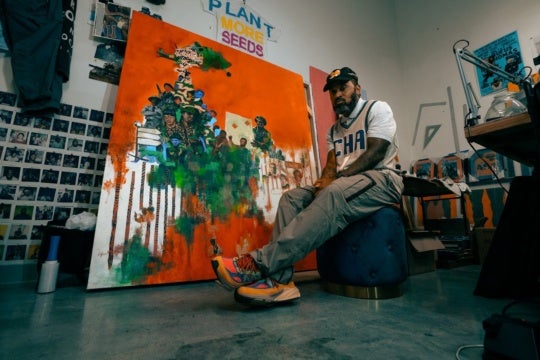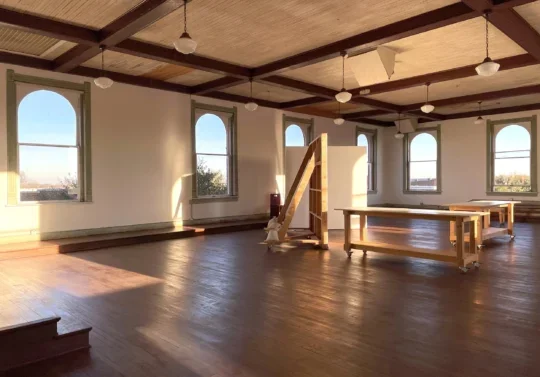
Linda Hall, in Barbara Archer’s 4×4 (featuring Benjamin Jones, Lydia Walls, Lynda Hall and Joseph Kurhajec)
The front room of Barbara Archer Gallery is currently transformed into a hunting hall of sorts by Tallahassee artist Linda Hall for the group exhibition 4×4 [May 17-June 29, 2013]. Hall’s Hollow Dogs and Holy Remnants series (2008-current), utilizes and repurposes antique hand-made quilts into ‘taxidermied’ animal carcasses, now encrusted with jewels, beading and paint. Hall’s work is installed in the gallery’s front room, and while it seems necessary that the works require a smaller, enclosed space to properly transmit an immerse environment, the exhibition’s overall installation choices seem ill-advised; Hall’s work could easily command space in the larger, back gallery without appearing jammed in a front room. The forms are haunting and successfully play with and call into question feminine craft and masculine sport. Her resulting sculptures are beautifully grotesque; the largest work, We Are What We Endanger (2008) reads as a bizarrely disemboweled bear carcass-cum-costume, establishing a (more haunting) reference to Marcel Dzama’s The Bear Suit Lady (2004). Hall’s installation feels like exploring a DIY natural history museum, where animal forms are exhibited as death delivered them: mouths agape, entrails removed, and literally lifeless forms. Instead of an entropic process, Hall’s additive sculptural practice subverts this natural order well.
-Rachel Reese

Marc Brotherton at the 9 Ace Gallery
The newly opened 9 Ace Gallery—in the Castleberry Hill window front that previously housed Get This! Gallery—is currently showing a selection of six works by long-time Atlanta artist Marc Brotherton [June 14-August 2013]. A bright palette and patterns reminiscent of an 80’s videogame run throughout the body of work. Brotherton successfully plays on analog versus digital codes, musical references and games with rhetoric, and the schematics of maneuvering in the world, most exemplified in the work Isn’t it a Pity? (2011) dominated by thick, surface-heavy black, painted over several controlled layers of smooth, white surface ground.
Brotherton’s two largest paintings [Isn’t it a Pity? (2011), 60×48 inches, and We’re Doing it to Ourselves (2012), 48×36 inches] resonate the most successfully: Hanging on the two largest walls, the intriguing forms and experimental yet hyper-controlled nature of these works quickly catch the viewer’s attention through Brotherton’s appealing linear language; his use of dominant black lines and vibrant colors work together to create complicated spaces, both literal and virtual.
The high level of variation in Brotherton’s work keeps the eye from focusing on one piece for too long. The plethora of different forms, mystifying spacial recessions, and textural uncertainties, constantly reinvent the viewer’s relationship between each piece. Brotherton writes, “The outcome of my work is a materialized investigation into the world that we live.” Brotherton’s brightly colored surfaces, systematic shapes, pixel-like patterns and precise isolation of surface quickly reinforce today’s ever-present digital screen culture.
-Edith Braggiotti-Painting and Alix Taylor
House rules for commenting:
1. Please use a full first name. We do not support hiding behind anonymity.
2. All comments on BURNAWAY are moderated. Please be patient—we’ll do our best to keep up, but sometimes it may take us a bit to get to all of them.
3. BURNAWAY reserves the right to refuse or reject comments.
4. We support critically engaged arguments (both positive and negative), but please don’t be a jerk, ok? Comments should never be personally offensive in nature.




